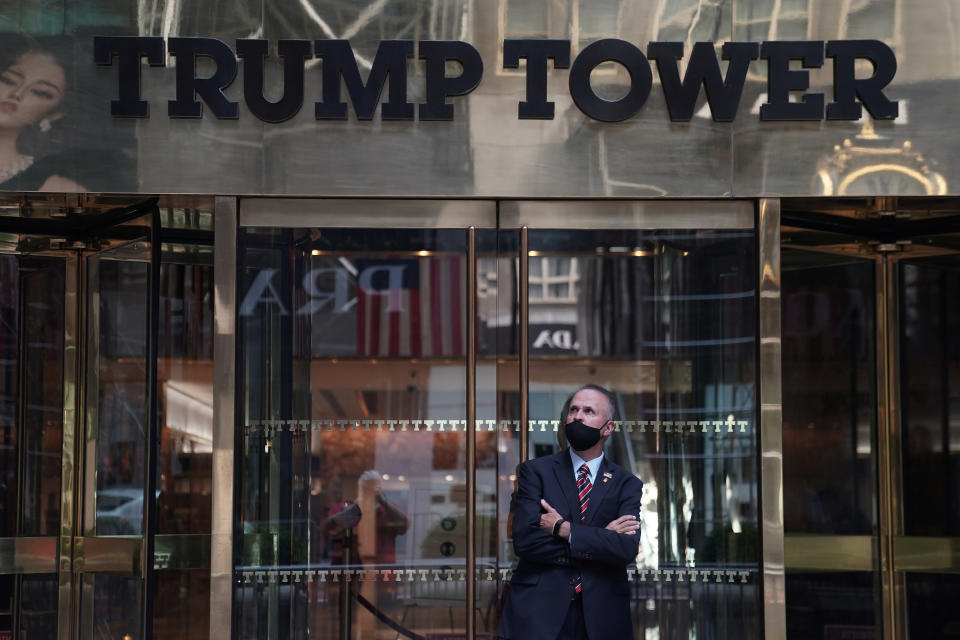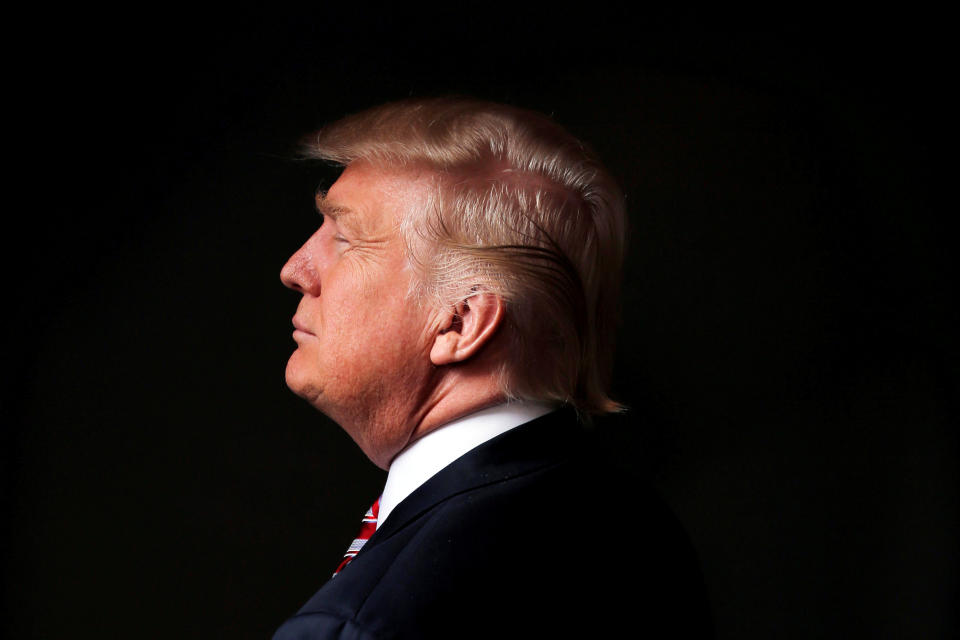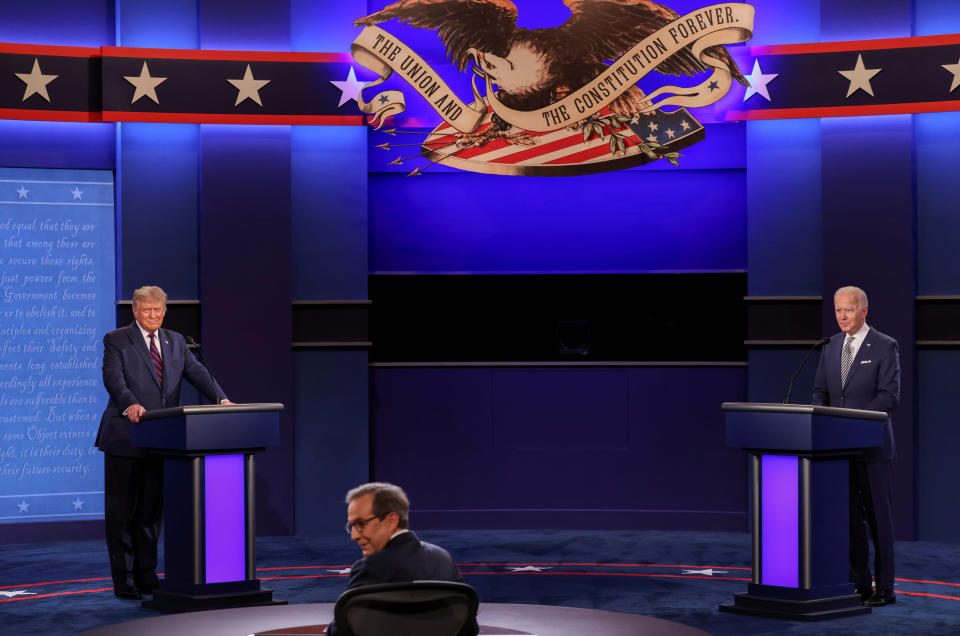How Trump and other real estate professionals get away with paying 'zero tax'
A revelation that President Donald Trump paid $1,500 in total income taxes over 12 separate years has sparked intense skepticism about the veracity and legality of his tax filings.
In an exclusive report Sunday citing tax data it obtained, The New York Times said the figures represent claimed liabilities of $750 for 2016, and $750 for 2017, the only income tax claimed for the 12 years, due to significant losses and deductions that offset gains.
While these losses reportedly enabled Trump to pay no income taxes for 10 years, taking advantage of the tax code isn’t illegal, unless the filer or their legal representative breaks the rules.
“It’s not uncommon for real estate professionals to pay zero tax if they have highly leveraged investments,” E. Martin Davidoff, a CPA who helps wealthy clients with tax strategies and disputes, told Yahoo Finance.
The practice is so common, Davidoff said, that there’s even an acronym for it. In certain circles, “ZT,” or zero tax is a goal for filers, he said, and has been especially easy to achieve under the laws that existed for real estate professionals before 1986 and after 1993, and for highly leveraged investors.
A generous tax rule for real estate professionals
In 2016, The New York Times reported that Trump claimed nearly $1 billion in losses on his 1995 tax return, which would have enabled him to reduce his income over the following 18 years. According to the Times, for the newer tax years it reviewed from Trump’s personal and business filings going back to 2000, Trump reported $315.6 million in losses for his golf courses, $55.5 million in losses for his Washington D.C. hotel, and $134 million in losses for the Trump Corporation.
A pertinent rule in today’s tax code that enables Trump to claim significant losses is IRC Rule 469(c)(7), which was enacted in 1993. The law provides special rules for certain taxpayers engaged in the real property business, by exempting them from passive loss limitations.

The rule’s generous provisions — which also permit real estate professionals to carry losses across multiple tax years — likely played a role in a reported $72.9 million tax refund the Times said Trump received in 2010, which has been subject to an audit since 2011. For the time period, Trump also received $21.2 million in state and local refunds.
Davidoff said because those who qualify under Rule 469 can generally depreciate commercial real estate property over 39 years, significant offsets to a real estate professional’s income are possible. As for Trump’s ability to cancel out hundreds of millions in profits, including those from Trump Tower that reportedly brings in $20 million per year, and $427.4 million in total profits related to “The Apprentice,” Davidoff said it’s difficult but not impossible.
For example, he explained, a $1 billion commercial real estate investment, without taking other strategies into consideration, can be depreciated each year by approximately $25 million. In addition, mortgage interest payments, real estate taxes, and operating expenses can be added as expenditures to further offset gains. Significant cash flow from such an asset can be generated, he explained, even through it may not ultimately produce taxable income.
Even more aggressive depreciation can be taken by “cost segregating” portions of real estate that permit depreciation over an accelerated period, and through non-recourse loans that can adjust the taxable basis for certain investments, Davidoff said.
Can Trump still claim he’s a real estate professional?
However, in order to qualify as a real estate professional with the right to take advantage of the tax code’s special rules, an individual must spend at least 750 hours materially participating in the real property trade or business, during the taxable year.
“He might not really qualify as a real estate professional at certain points in time,” Davidoff said, explaining that authorities will examine the claim.
The tax code’s special rules would require Trump to show in years that he utilized the advantages — including in 2017, 2018, 2019, and 2020 during his job as president of the U.S. — he spent the equivalent of 18.75 of a standard 40-hour work weeks engaged in the real estate profession.

He would also be required to meet the hourly threshold during tax years when he earned the bulk of his income through his role on NBC’s “The Apprentice” and through image licensing deals.
“I'm not sure I would describe him as a real estate developer any longer, as opposed to the [Trump Organization’s] 500 enterprises that seem to be much more sprawling than just real estate,” said tax lawyer Steven Rosenthal, who serves as a senior fellow for the Tax Policy Center.
Personal v. business expenses
Other areas where Trump’s filings are likely to get legal or regulatory scrutiny, experts say, are expenditures reportedly taken as deductions, yet often considered personal.
In 2014, Trump claimed $2.2 million in business expenses for property taxes paid on a New York estate that the Trump Organization website describes as a retreat for family outings, the Times reported. Other expenses in excess of $70,000 and $95,000, respectively, the Times said were claimed as business expenses for hair styling in connection with “The Apprentice,” and for payments to a hair and makeup artist favored by the president’s daughter, Ivanka Trump.
Legal fees reportedly spent on an attorney who represented the president during the Russia investigation, and money spent on aircraft fuel for flights between Trump’s residences and other properties, could also attract heightened legal scrutiny.

“What concerns me is not whether he took advantage of 469(c)(7) but whether Trump used his facilities — golf courses or personal residences — for personal rather than business purposes,” Davidoff said. “There may be some lines there that may have been crossed, or not crossed.”
Rosenthal said he cannot know whether Trump’s personal and business filings report legitimate expenses absent reviewing and auditing his tax filings.
“I don’t think all rich guys do this and I don’t think all real estate guys do this,” he said.
Davidoff said from his experience, the sentiment to reduce taxes is shared among Americans who work across some of the country’s most trusted industries, including doctors, teachers and police officers.
“That’s why I’m in business...to help clients maximize after tax cash flow,” Davidoff said.
Still, Trump has paid far less in taxes than many Americans.
In 2017, U.S. wage earners who made between $30,000 and $40,000 paid average income taxes of $877, according to Americans for Tax Fairness, which cited data from the Bureau of Labor Statistics. Those who earned between $50,000 and $75,000 paid $4,920 on average. And those earned between $100,000 and $200,000 paid $17,106.
The Times report appears to reflect Trump’s attitude regarding tax as sport, rather than as a shared responsibility, according to Rosenthal, the tax lawyer with the Tax Policy Center.
“I’ve just seen so much aggressive behavior by Trump,” Rosenthal said of the report and his own prior research into Trump’s tax filings that he says are egregious and raise questions about whether the president’s deductions and losses are legally justified.
“I don’t know enough facts to say definitively that this crossed the line into criminal behavior,” Rosenthal said.
For his part, Trump has disputed the article from The Times. “I paid millions of dollars in income taxes, millions of dollars in income tax,” Trump told Chris Wallace of Fox News during Tuesday’s debate when asked how much income tax he paid for the two years.
“I don’t want to pay tax. Before I came here I was a private developer,” Trump said. “I was private business people like every other private person that, unless they're stupid, they go through the laws and that's what it is.”
Alexis Keenan is a legal reporter for Yahoo Finance and former litigation attorney.
Follow Alexis Keenan on Twitter @alexiskweed.
Read more:
Nikola could find itself in legal trouble if short seller claims are true
Labor Department proposes definition for independent contractors for the first time ever
Short seller rejects Nikola’s explanation as ‘tacit admission of securities fraud’
Large-scale airline layoffs could cause ‘great, great economic harm’
Follow Yahoo Finance on Twitter, Facebook, Instagram, Flipboard, LinkedIn, and reddit.
